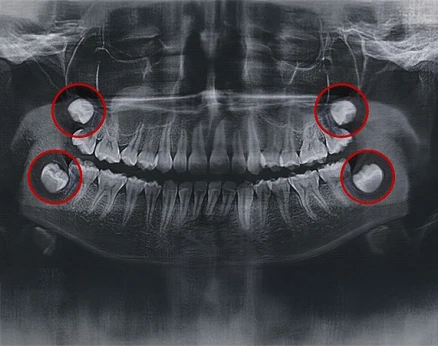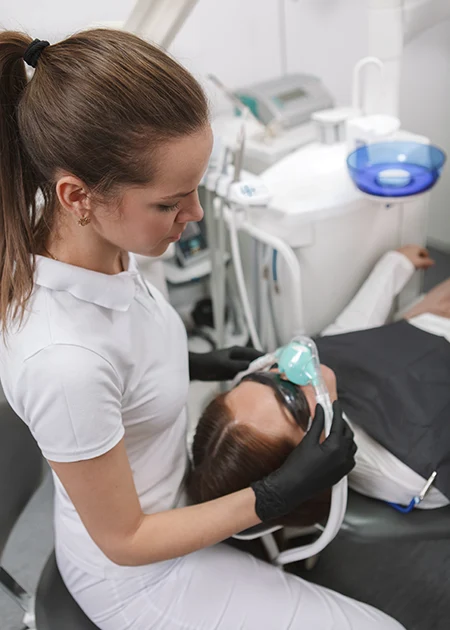Sedation Dentistry For
Wisdom Teeth Removal
Glenpool, OK

Sedation Dentistry for Wisdom Teeth Removal in Tulsa & Surrounding Areas
What You Need to Know
Wisdom teeth removal is a common dental procedure that many people undergo, especially in their late teens or early twenties. For some, the experience can be nerve-wracking, especially if the wisdom teeth are impacted or the thought of oral surgery causes anxiety. Thankfully, sedation dentistry offers a safe and effective solution for patients who want a more comfortable experience while getting their wisdom teeth pulled. Understanding the sedation options available and the associated costs can help you prepare for your procedure and ensure a smooth, stress-free recovery.


What is Sedation Dentistry?
Sedation dentistry uses medication to help patients relax during dental procedures. For wisdom teeth removal, sedation can range from mild relaxation to a state of near sleep, depending on the patient’s needs and preferences. Although sedation can make patients feel calm and at ease, it doesn’t necessarily mean they will be unconscious or fully asleep. The primary goal of sedation is to alleviate anxiety and ensure that the patient remains comfortable throughout the extraction process.
At our Tulsa area practices, we don’t give patients general anesthesia for wisdom tooth extractions. Instead, we focus on numbing the area thoroughly and offering a variety of sedation options. This ensures the patient remains fully relaxed throughout the entire procedure. With oral conscious sedation or IV sedation, patients may feel calm enough that they actually doze off, but they can usually be easily awakened in this scenario.
What is Sedation Dentistry?
Sedation dentistry uses medication to help patients relax during dental procedures. For wisdom teeth removal, sedation can range from mild relaxation to a state of near sleep, depending on the patient’s needs and preferences. Although sedation can make patients feel calm and at ease, it doesn’t necessarily mean they will be unconscious or fully asleep. The primary goal of sedation is to alleviate anxiety and ensure that the patient remains comfortable throughout the extraction process.
At our Tulsa area practices, we don’t give patients general anesthesia for wisdom tooth extractions. Instead, we focus on numbing the area thoroughly and offering a variety of sedation options. This ensures the patient remains fully relaxed throughout the entire procedure. With oral conscious sedation or IV sedation, patients may feel calm enough that they actually doze off, but they can usually be easily awakened in this scenario.

Types of Sedation for Wisdom Teeth Removal
Several sedation options are available for wisdom teeth removal, and your dentist or oral surgeon will help determine which one is best suited for your needs:
1. Nitrous Oxide: commonly known as “laughing gas” – is typically used for minor dental procedures. It helps patients feel relaxed and at ease during treatment, while still remaining awake and aware. This sedative is administered through a mask, providing gentle relief from anxiety and mild discomfort, and it quickly wears off after the procedure, allowing patients to resume their day with minimal downtime.
2. Oral Conscious Sedation: For patients who feel anxious about the procedure, oral conscious sedation is a popular choice. You take a prescribed sedative pill, which helps you feel relaxed and calm. While you’ll remain awake and aware of what’s happening, you may feel drowsy and have little memory of the procedure afterward.
3. IV Sedation by Lifeguard Anesthesia: Ideal for patients with high levels of anxiety, lengthy surgical procedures, younger patients (pediatric), or individuals with disabilities, IV sedation offers a deep level of relaxation. Administered directly through an IV, this method helps patients enter a “twilight” state, where they are completely under anesthesia. This approach is beneficial for those who may feel overwhelmed by dental treatments, as it allows for a stress-free experience and can be adjusted for the specific needs of each patient.

The Cost of Wisdom Teeth Removal with Sedation
The cost of wisdom teeth extraction depends on factors like the complexity of the procedure, the number of teeth being removed, and the type of sedation chosen. Generally, impacted wisdom teeth tend to be more costly due to the added complexity, and sedation options can also influence the overall price. A consultation can provide a personalized cost estimate based on these specifics.

Here’s a general breakdown of costs:
● Nitrous Oxide: The most affordable option, usually included in the base price of wisdom teeth removal.
● Oral Conscious Sedation: This option can increase the overall cost of the procedure, with the final amount depending on the dosage required and the provider’s fees.
● IV Sedation: IV sedation generally costs more than oral sedation, with the total depending on factors like the procedure’s length and specific requirements.
While sedation may increase the overall cost of wisdom teeth removal, many patients find the additional expense worthwhile for the peace of mind and comfort it provides.
The Cost of Wisdom Teeth Removal with Sedation
Here’s a general breakdown of costs:
● Nitrous Oxide: The most affordable option, usually included in the base price of wisdom teeth removal.
● Oral Conscious Sedation: This option can increase the overall cost of the procedure, with the final amount depending on the dosage required and the provider’s fees.
● IV Sedation: IV sedation generally costs more than oral sedation, with the total depending on factors like the procedure’s length and specific requirements.
While sedation may increase the overall cost of wisdom teeth removal, many patients find the additional expense worthwhile for the peace of mind and comfort it provides.

Conclusion
Wisdom teeth extraction is a routine procedure, but for many people, the thought of oral surgery can be intimidating. Sedation dentistry offers a solution for patients who want to feel relaxed and comfortable during their procedure. By choosing the right sedation option, you can make the experience easier and more manageable. If you’re concerned about costs, talk to your dentist or oral surgeon about your options—they can help you find the right combination of care and affordability for your needs.